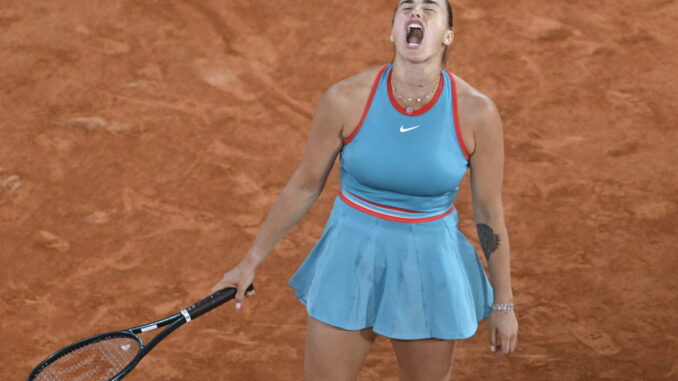
Aryna Sabalenka, the world No. 1 and three-time Grand Slam champion, is known for her explosive power and unrelenting intensity on the tennis court. As she prepares to face Coco Gauff in her maiden Roland Garros final on June 7, 2025, her coaches have pulled back the curtain on how they navigate her fiery outbursts during matches. The Belarusian’s passionate exchanges with her team, often marked by shouts and animated gestures, have become a hallmark of her competitive persona. In a candid press conference ahead of the French Open final, her coaches, Anton Dubrov and Jason Stacy, revealed their approach to managing these moments, offering a glimpse into the unique dynamic that fuels Sabalenka’s success.
Sabalenka’s journey to the Roland Garros final has been a masterclass in dominance. She stormed through the tournament, defeating Kamilla Rakhimova, Jil Teichmann, Olga Danilovic, Amanda Anisimova, and Qinwen Zheng in straight sets before outlasting Iga Swiatek in a thrilling three-set semifinal, 7-6(7), 4-6, 6-0. Her aggressive baseline game and improved serve, once a liability with 440 double faults in 2022, have propelled her to the top. Yet, it’s her emotional intensity that often steals the spotlight. During matches, Sabalenka is known to direct her frustration toward her coaching box, shouting and gesturing as she battles both her opponent and her own expectations. “It’s always different,” Dubrov said when asked how he responds to her outbursts. His cryptic yet pragmatic response reflects the team’s understanding that Sabalenka’s vocal eruptions are part of her process, a way to channel the stress of high-stakes tennis.
Jason Stacy, Sabalenka’s fitness coach and a martial arts expert, elaborated on their strategy with a simple team mantra: “Don’t fight it, don’t feed it.” He explained, “We don’t want to fight it because the stress, anxiety, pressure, the mistakes, all those things are going to be there, so you can’t pretend it’s not going to be a thing. But you don’t want to feed it either, and give it too much energy and power. Accept the way it is, understand what you have control over, and just focus on that.” This approach underscores the team’s philosophy of letting Sabalenka express her emotions without escalating the tension, allowing her to reset and refocus. It’s a delicate balance, especially given her history of overcoming serving yips with the help of biomechanics specialist Gavin MacMillan, who helped her reduce double faults dramatically since 2022.
Sabalenka’s fiery temperament has drawn mixed reactions. Former coach Rennae Stubbs criticized her sarcastic post-match comments toward her team, calling them “passive aggressive and a little annoying” after her 2025 Stuttgart Open final loss to Jelena Ostapenko. Yet, Sabalenka’s current team views her intensity as a strength. “I am really grateful to have all of them on my team, we are like family,” she said, emphasizing the close-knit bond that allows her to jest, as when she jokingly blamed her team for not securing a Porsche at Stuttgart: “Well, every year my team [is] hoping to get the car and we’re gonna drive the car in Miami—not this year.” Her humor, often laced with sarcasm, is a coping mechanism, evident when she told her coaches after her 2025 Australian Open final loss to Madison Keys, “I don’t want to see you for the next week. I really hate you,” before adding, “No, anyway, thank you so much for everything you are doing for me.”
This dynamic has been key to Sabalenka’s evolution into a three-time Grand Slam champion, with titles at the 2023 and 2024 Australian Opens and the 2024 US Open. Her coaches’ ability to absorb her intensity while guiding her technical and mental growth has been pivotal. Dubrov, a former hitting partner turned head coach since 2020, uses unconventional methods, like screaming insults during practice to simulate crowd pressure, helping Sabalenka thrive in hostile environments. “She’s more mature, to understand what you need to do to be on this level,” Dubrov noted, crediting her ability to adapt even when not at her peak.
As Sabalenka faces Gauff in a tightly contested rivalry (their head-to-head is tied at 5-5), her team’s steady presence will be crucial. The final, a rematch of their 2023 US Open final won by Gauff, promises intense exchanges on Court Philippe-Chatrier. “She can come up with some big shots and big winners pretty much at all areas of the court,” Gauff said of Sabalenka, acknowledging her opponent’s relentless fight. For Sabalenka, the support of her “family” in the coaching box, unfazed by her shouts, will be her anchor as she chases her first Roland Garros title, proving that her fiery spirit, when channeled, is her greatest asset.
Leave a Reply